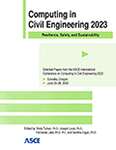Urban Pavement Performance Modeling Methodology with Artificial Intelligence
Publication: Computing in Civil Engineering 2023
ABSTRACT
Pavement performance models are a handy tool for road management agencies, allowing them to estimate pavement condition and designate the optimal corrective measure for road maintenance. Recent research has presented favorable results when using machine and deep learning techniques in pavement performance modeling. This research proposes a methodology for developing first-phase performance models for urban pavements, managed at the network level, for short-term condition prediction using machine and deep learning techniques in their construction. Specifically, random forest regression (RFR), support vector regression (SVR), gradient boosting regression (GBR), artificial neural networks (ANN), and recurrent neural networks (RNN) are used, and models are built to predict the Chilean urban pavement condition index (UPCI) with these algorithms, using a synthetic database developed in-house for the simulations. As for the obtained results, the iterations offer favorable results for short-term prediction, getting low average prediction errors (0.4% for the GBR algorithm) and RMSE results close to zero (0.063 for the GBR algorithm), which is relevant for each of the alternatives mentioned above, as it places them as recommendable tools for predicting urban pavement performance.
Get full access to this article
View all available purchase options and get full access to this chapter.
REFERENCES
Fausset, L. (1994). What is a Neural Net?. Fundamentals of neural networks: architectures, algorithms, and applications D. Fowley, B. Baker, and A. Dworkin, eds., Prentice Hall, Englewood Cliffs, NJ, 3–4.
Hossain, M. I., Gopisetti, L. S. P., and Miah, M. S. (2019). International roughness index prediction of flexible pavements using neural networks. Journal of transportation engineering, part B: pavements, 145(1), 04018058.
Lin, J. D., Yau, J. T., and Hsiao, L. H. (2003, January). Correlation analysis between international roughness index (IRI) and pavement distress by neural network. In 82nd Annual Meeting of the Transportation Research Board (Vol. 12, No. 16, pp. 1-21).
Marcelino, P., Antunes, L. E., and Castilho Gomes, M. (2019). Machine learning approach for pavement performance prediction. International Journal of Pavement Engineering, 1–14.
Mazari, M., and Rodriguez, D. D. (2016). Prediction of pavement roughness using a hybrid gene expression programming-neural network technique. Journal of Traffic and Transportation Engineering (English Edition), 3(5), 448–455.
Montecinos, A. (2021). Metodología y aplicación de algoritmos de Machine Learning en el desarrollo de modelos de desempeño de pavimentos aeroportuarios en Chile.
Osorio, A., Chamorro, A., Tighe, S., and Videla, C. (2014). Calibration and validation of condition indicator for managing urban pavement networks. Transportation Research Record, 2455(1), 28–36.
Osorio-Lird, A., Chamorro, A., Videla, C., Tighe, S., and Torres-Machi, C. (2018). Application of Markov chains and Monte Carlo simulations for developing pavement performance models for urban network management. Structure and Infrastructure Engineering, 14(9), 1169–1181.
Scikit-learn: Machine Learning in Python, Pedregosa et al., JMLR 12, pp. 2825–2830, 2011.
Solminihac, H., Echaveguren, T., and Chamorro, A. (2018). Gestión de Infraestructura Vial. Santiago, Chile: Ediciones Universidad Católica de Chile.
Solorio Murillo, J. R., Márquez Mendoza, Z. D., Montoya Ortega, M., Cárdenas Rodríguez, S. L., and Hernández Domínguez, R. I. (2014). Aplicación de métodos markovianos en el modelado del deterioro de carreteras. Publicación Técnica, (396).
Wang, Z., Guo, N., Wang, S., and Xu, Y. (2021). Prediction of highway asphalt pavement performance based on Markov chain and artificial neural network approach. The Journal of Supercomputing, 77, 1354–1376.
Yang, X., Guan, J., Ding, L., You, Z., Lee, V. C., Hasan, M. R. M., and Cheng, X. (2021). Research and applications of artificial neural network in pavement engineering: a state-of-the-art review. Journal of Traffic and Transportation Engineering (English Edition), 8(6), 1000–1021.
Zhou, Q., Okte, E., and Al-Qadi, I. L. (2021). Predicting Pavement Roughness Using Deep Learning Algorithms. Transportation Research Record, 2675(11), 1062–1072.
Information & Authors
Information
Published In
History
Published online: Jan 25, 2024
ASCE Technical Topics:
- Artificial intelligence and machine learning
- Computer programming
- Computing in civil engineering
- Construction equipment
- Design (by type)
- Engineering fundamentals
- Equipment and machinery
- Gravels
- Highway and road design
- Highway and road management
- Highway transportation
- Infrastructure
- Neural networks
- Pavement condition
- Pavement design
- Pavements
- Sight distances
- Transportation engineering
- Urban and regional development
Authors
Metrics & Citations
Metrics
Citations
Download citation
If you have the appropriate software installed, you can download article citation data to the citation manager of your choice. Simply select your manager software from the list below and click Download.
